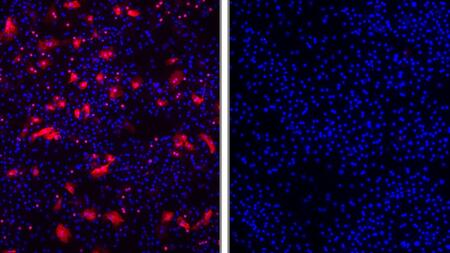Myrcludex B: First-in-class drug for the treatment of hepatitis B and D
No entry for Hepatitis D viruses (red; left) in hepatocytes with Myrcludex B (right).
DZIF scientists at the Heidelberg University Hospital developed a virus blocker against hepatitis B and D, which has been successful in two clinical trials
Around 350 million people suffer from chronic hepatitis B, 25 million from hepatitis D which only occurs in conjunction with hepatitis B. In the majority of cases, the existing approved therapies for hepatitis B do not usually cure the disease, and there is no specific treatment available for hepatitis D. Novel therapeutic strategies are therefore of great value. At the Heidelberg University Hospital, DZIF Professor Stephan Urban and his research team developed an active agent, myrcludex B, which inhibits the entry of hepatitis B and D viruses into liver cells in in vitro animal tests. In two clinical trials, the scientists have now been able to show that the active agent is very well tolerated in humans, and actually also has an effect on hepatitis D viruses in humans.
“Myrcludex B is the first member of a new drug class for hepatitis B and D,” explains Prof Walter E. Haefeli, who conducted the phase-I-trial together with Dr Antje Blank at the Heidelberg University Hospital. “For the first time, the agent has been administered successfully and is very well tolerated in humans. This is a milestone in the development of any drug,” the scientist explains. In the Clinical Research Unit KliPS, which is specialised in conducting first-in-human trials, 36 healthy volunteers were administered injections of the active agent, up to high doses of 20mg. Blank, the first author of the published trial results (Blank et al. 2016) is enthusiastic, “Myrcludex B was very well tolerated all the way through to the highest dose, and we now know how the drug behaves in the human body, and we can use this information for further studies.”
In the second trial, which is still ongoing and being conducted at the Moscow Regional Research Clinical Institute in Russia, the assumption that myrcludex B actually has an effect on hepatitis D viruses has already been confirmed. 24 patients with chronic hepatitis D took part in this pilot trial and received either the new active agent or interferon alpha, or a combination of both. “The interim results of this trial show that after half a year myrcludex B significantly reduces hepatitis D ribonucleic acid viral loads in a part of the patients. At the same time it was well-tolerated and led to a normalisation of liver values,” summarises Urban. As this would be the first specific drug for treating hepatitis D infection, the most aggressive form of viral liver inflammation, the researchers see good chances of developing it further rapidly, and hope that the positive results seen to date will be confirmed in larger trials. (Bogomolov et al. 2016)
The development of myrcludex B is an example of very successful hepatitis research at the DZIF. The DZIF scientists are also involved in projects for improving hepatitis C treatment. They have found ways of specifically targeting hepatitis B virus hereditary information in liver cell nuclei. This also opens up new treatment possibilities. The DZIF collaborates closely with the German Liver Foundation and gets clinical trials underway.




